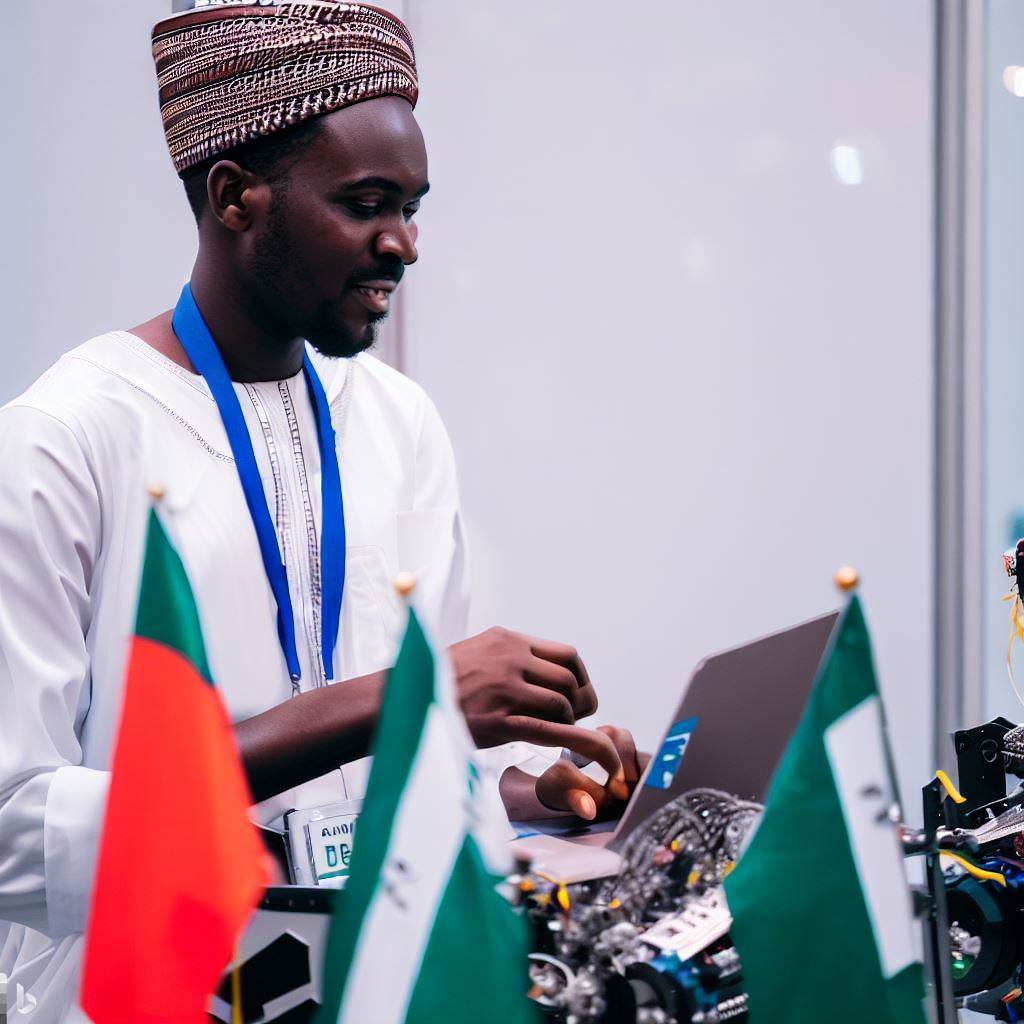Introduction
Robotics engineering in Nigeria has witnessed a notable evolution.
With a growing influx of foreign technological advancements, this blog post delves into the significant role played by foreign technology in shaping Nigerian robotics engineering.
Foreign tech has become a pivotal driver of innovation in Nigerian robotics engineering.
It has not only introduced cutting-edge concepts but has also facilitated cross-cultural collaborations, fostering a dynamic landscape for growth.
The infusion of foreign technology has propelled the growth of Nigerian robotics engineering by expediting knowledge transfer and fostering skill development.
This symbiotic relationship has paved the way for indigenous engineers to adapt and contribute uniquely to the field.
As foreign technology continues to interlace with indigenous expertise, Nigerian robotics engineering stands poised for remarkable advancements.
By embracing this hybrid approach, the field is well-positioned to overcome challenges and lead in innovative robotics solutions.
In general, the influence of foreign tech on Nigerian robotics engineering is undeniable, acting as a catalyst for growth, development, and the emergence of a vibrant, globally connected ecosystem.
Historical Background of Nigerian Robotics Engineering
Brief history of robotics engineering in Nigeria:
Robotics engineering in Nigeria has a relatively short history, starting in the late 1990s.
It began as a small community of enthusiasts, mostly self-taught individuals passionate about robotics.
During this time, access to resources and technology was limited, but interest and dedication were high.
Development of robotic labs and educational institutions in the country
With a growing interest in robotics, Nigerian universities and institutions started recognizing the potential.
Robotics labs and departments were established, providing a platform for students to learn and experiment.
These institutions collaborated with foreign tech companies to obtain advanced equipment and knowledge.
Highlight of key achievements in Nigerian robotics engineering
Nigerian robotics engineering has made significant strides over the years.
The AKRABAT Robot developed by Nigerian engineers was a major breakthrough in the country.
It showcased Nigeria’s capability to design and build sophisticated robots for various applications.
The development of the Road Rover, a robot designed to assist with road maintenance, was another notable achievement.
Nigerian robotics engineers have also excelled in international competitions, showcasing their skills and expertise.
These achievements have not only advanced the field of robotics engineering in Nigeria but also expanded its practical applications.
Foreign tech influence has played a crucial role in the success of Nigerian robotics engineering.
Collaborations with foreign companies have provided access to cutting-edge technology and expertise.
Foreign experts have also conducted workshops and training sessions to enhance the skills of Nigerian engineers.
This exchange of knowledge and resources has accelerated the growth of robotics engineering in Nigeria.
Overall, the historical background of Nigerian robotics engineering reflects a journey of passion, determination, and collaboration.
The establishment of robotic labs, educational institutions, and key achievements demonstrate the progress made in the field.
With continued foreign tech influence, Nigerian robotics engineering is poised for even greater accomplishments in the future.
Overview of Foreign Technologies
Foreign technologies have had a profound impact on the field of robotics engineering in Nigeria.
These technologies, brought by major foreign tech companies, have revolutionized the way robotic systems are designed, developed, and utilized in the country.
Introduction to major foreign tech companies involved in robotics
The global landscape of robotics engineering is dominated by a few major foreign tech companies.
These companies have invested heavily in research and development to push the boundaries of robotics technology.
One such company is Boston Dynamics, known for its groundbreaking humanoid and quadrupedal robots.
Their robots possess human-like capabilities, enabling them to perform complex tasks with ease.
Other notable foreign tech companies involved in robotics are ABB Robotics, Kuka Robotics, and Fanuc Corporation.
ABB Robotics specializes in industrial robots that are widely used in manufacturing processes.
Kuka Robotics is known for its expertise in collaborative robots, which are designed to work alongside humans.
Fanuc Corporation focuses on robotic automation systems and is a leader in industrial robot manufacturing.
Explanation of the advanced technologies and innovations brought by foreign companies
These foreign tech companies have brought advanced technologies and innovations that have significantly enhanced robotics engineering in Nigeria.
One of the major advancements is in the field of artificial intelligence (AI) and machine learning.
AI enables robots to learn from their environment and make autonomous decisions, while machine learning allows robots to continuously improve their performance based on data analysis.
Additionally, foreign companies have introduced advanced sensor technologies such as lidar, radar, and cameras.
These sensors provide robots with the ability to perceive and interact with their surroundings accurately.
They allow robots to navigate unfamiliar environments and detect obstacles, enhancing their safety and efficiency.
Foreign companies have also made significant strides in developing robotic exoskeletons.
These wearable robotic devices augment human capabilities, enabling individuals with mobility impairments to regain their freedom of movement.
Exoskeletons are being used in rehabilitation centers and enabling injured individuals to walk again.
Examples of foreign robotic technologies being utilized in Nigeria
Nigeria has embraced various foreign robotic technologies and integrated them into different sectors.
In the healthcare sector, robotic surgical systems have revolutionized surgical procedures, making them less invasive and more precise.
Robot-assisted surgeries have reduced the risk of complications, accelerated patient recovery, and improved overall surgical outcomes.
In agriculture, drones equipped with cameras and sensors are being used for crop monitoring, irrigation management, and pest control.
These drones are capable of collecting valuable data about crop health, moisture levels, and pest infestations.
This helps farmers make informed decisions, optimize resource usage, and increase crop yields.
Foreign robotic technologies have also found applications in the transportation sector.
Companies are testing and implementing self-driving cars and autonomous delivery robots in Nigeria.
These robots have the potential to enhance road safety, reduce traffic congestion, and improve the efficiency of package delivery systems.
In fact, the influence of foreign tech on Nigerian robotics engineering cannot be overlooked.
Major foreign tech companies have introduced advanced technologies, innovations, and robotics solutions that have revolutionized various sectors in Nigeria.
These technologies have improved productivity, efficiency, and safety, making robotics engineering an integral part of Nigeria’s technological advancement.
Influence of Foreign Tech on Nigerian Robotics Engineering
Enhancement of research and development capabilities
Foreign technology has greatly enhanced Nigeria’s research and development capabilities in robotics engineering, enabling them to expand their knowledge and innovation in the field.
- Access to advanced tools and equipment: Nigerian engineers now have access to cutting-edge robotic hardware and software, allowing them to conduct more sophisticated research and development.
- Collaboration with international experts: The influx of foreign tech has opened up opportunities for Nigerian engineers to collaborate with international experts, fostering knowledge exchange and cross-cultural learning.
- Improved infrastructure: Foreign technology has also contributed to the advancement of infrastructure in Nigeria, providing better facilities for research and development purposes.
Boost in collaboration opportunities with international experts
Foreign technology has facilitated collaboration between Nigerian robotics engineers and international experts, enabling them to tap into a global network of knowledge and expertise.
- Knowledge sharing: By collaborating with international experts, Nigerian engineers gain access to a diverse range of knowledge and perspectives that can enrich their understanding of robotics engineering.
- Technical support and mentorship: International experts provide technical support and mentorship to Nigerian engineers, guiding them in their research and helping them overcome technical challenges.
- Joint research projects: Collaborating with international experts opens doors for joint research projects, allowing Nigerian engineers to work on cutting-edge technology and contribute to global advancements in robotics.
Acquisition of advanced knowledge and skills through foreign training programs
Foreign tech has enabled Nigerian robotics engineers to acquire advanced knowledge and skills through training programs offered by international institutions.
- Exposure to state-of-the-art training facilities: Nigerian engineers attending foreign training programs are exposed to state-of-the-art facilities, giving them hands-on experience with the latest robotic technologies.
- Expert-led training sessions: Training programs conducted by international experts provide Nigerian engineers with valuable insights and expertise in robotics engineering.
- Cultural exchange and networking opportunities: Foreign training programs offer Nigerian engineers the chance to interact with professionals from different countries, fostering cultural exchange and expanding their professional networks.
Increased access to cutting-edge robotic hardware and software
The influence of foreign tech has led to increased access to cutting-edge robotic hardware and software in Nigeria, enabling engineers to work with the latest technologies.
- Expanded availability of robotic components: Nigerian engineers now have access to a wider range of robotic components and technologies, allowing them to build advanced robotics systems.
- Integration of foreign software solutions: Foreign tech has introduced Nigerian engineers to advanced software solutions, enabling them to develop more sophisticated robotics applications.
- Adoption of international standards: Access to foreign tech has prompted Nigerian robotics engineers to adopt international standards and best practices in their work, improving the quality and competitiveness of their projects.
All in all, the influence of foreign tech on Nigerian robotics engineering has brought about significant benefits including enhanced research and development capabilities, collaboration opportunities with international experts, acquisition of advanced knowledge and skills, and increased access to cutting-edge hardware and software.
These developments have accelerated the growth of robotics engineering in Nigeria and positioned the country as a player in the global robotics industry.
Read: Career Progression for Petroleum Engineers in Nigeria

Impacts on Nigerian Robotics Engineering
In recent years, the influence of foreign technology on Nigerian robotics engineering has been undeniable.
This blog section will explore how this influence has impacted Nigerian robotics engineering in terms of accelerating local capabilities and expertise, expanding the scope and applications of robotics engineering, bringing economic benefits, and positively influencing education and skill development.
Acceleration of local capabilities and expertise
The introduction of foreign tech has played a remarkable role in accelerating the development of local capabilities and expertise in Nigerian robotics engineering.
Through collaborations, knowledge exchange, and access to advanced technologies, local engineers and researchers have been able to enhance their skills and knowledge.
Nigerian engineers have gained exposure to cutting-edge technologies and techniques, allowing them to stay updated with global advancements.
This has resulted in their ability to design and develop complex robotic systems that were previously beyond their capabilities.
Expansion of the scope and applications of robotics engineering in Nigeria
The influence of foreign tech has expanded the scope and applications of robotics engineering in Nigeria.
However, with the introduction of foreign tech, robotics applications have diversified into various sectors, including healthcare, agriculture, and transportation.
This expansion of applications has opened up new avenues for Nigerian engineers to innovate and develop solutions tailored to local challenges.
Economic benefits through the growth of the robotics industry
The growth of the robotics industry, driven by the influence of foreign tech, has brought significant economic benefits to Nigeria.
The establishment of local robotics companies and the influx of foreign investment have created job opportunities and contributed to the country’s GDP.
Moreover, the increased adoption of robotics systems in industries has improved productivity, efficiency, and overall competitiveness.
This has led to cost savings for businesses, fostering economic growth and attracting more investments in the robotics sector.
Positive influence on education and skill development in the field
Foreign tech’s influence on Nigerian robotics engineering has had a positive impact on education and skill development in the field.
The collaboration between foreign robotics companies and Nigerian universities has facilitated the transfer of knowledge and expertise.
Through academic partnerships, students have gained access to advanced educational programs, internships, and research opportunities.
This exposure has not only enhanced their theoretical knowledge but also equipped them with practical skills required in the world of robotics engineering.
In fact, the influence of foreign tech on Nigerian robotics engineering has had several profound impacts.
It has accelerated the development of local capabilities and expertise, expanded the scope and applications of robotics engineering, brought economic benefits, and positively influenced education and skill development.
These impacts have positioned Nigeria as a key player in the global robotics industry and have the potential to drive future technological advancements in the country.
Read: Addressing the Skill Gap in Nigeria’s Petroleum Engineering
Publish Your Professional Profile, Business or Brand
Showcase your expertise, gain trust, and boost visibility instantly on Professions.ng.
Publish NowUncover the Details: Nigeria’s Electronic Engineering: Challenges & Solutions
Challenges and Concerns
Innovation is the lifeline of any thriving robotics engineering community.
However, the influence of foreign technology on Nigerian robotics engineering brings with it a set of challenges and concerns that need to be addressed.
Potential reliance on foreign technologies hindering local innovations
One of the key concerns is the potential reliance on foreign technologies, which could hinder the development of local innovations.
When Nigerian engineers heavily depend on foreign technologies, they may become complacent and fail to explore their own creative solutions.
This can stifle the growth of the local robotics engineering industry.
Solution
To address this challenge, there is a need for Nigerian engineers to strike a balance between adopting foreign technologies and continuing to develop their indigenous solutions.
This can be achieved through increased investment in research and development, promoting entrepreneurship, and fostering collaborations between academia and industry.
Issues of technology transfer and intellectual property rights
Another significant challenge is the issue of technology transfer and intellectual property rights.
When foreign technologies are introduced into Nigeria, there is a risk of knowledge and skills transfer being limited, and intellectual property rights not adequately protected.
Solution
To overcome this challenge, it is crucial for the Nigerian government to establish policies that protect intellectual property rights and encourage technology transfer.
Collaborations with foreign tech companies should be based on fair partnerships that ensure knowledge sharing, skill development, and appropriate compensation for intellectual property.
Possible cultural and contextual challenges in implementing foreign tech in Nigeria
Cultural and contextual challenges can arise when implementing foreign technologies in Nigeria.
It is essential to consider the local environment, resources, and cultural norms to ensure a seamless integration of foreign tech.
Solution
Nigerian robotics engineers should carefully evaluate the suitability of foreign technologies in the local context.
This can be achieved through cultural exchange programs, partnerships with local communities, and conducting comprehensive feasibility studies before implementing new technologies.
While the influence of foreign technology on Nigerian robotics engineering brings promising advancements, it also presents challenges and concerns.
By addressing potential reliance on foreign technologies, improving technology transfer and intellectual property rights, and considering cultural and contextual factors, Nigeria can maximize the benefits of foreign tech while fostering local innovations.
Read: Electronic Engineering Industry: An Overview in Nigeria
Future Outlook
Discussion on the potential for strategic partnerships between local and foreign tech companies
- Strategic partnerships between local and foreign tech companies can greatly benefit Nigerian robotics engineering.
- Collaboration between these companies can lead to knowledge sharing and technology transfer.
- Local tech companies can learn from the expertise and experience of their foreign counterparts.
- Strategic partnerships can also provide funding and resources for research and development in robotics engineering.
- Joint ventures can contribute to the growth and expansion of the robotics industry in Nigeria.
- Foreign tech companies can benefit from the local market knowledge and cultural understanding of Nigerian partners.
Emphasis on the role of Nigerian engineers in shaping the future of robotics engineering in the country
- Nigerian engineers play a crucial role in the development and advancement of robotics engineering in the country.
- They bring unique perspectives and insights that can contribute to innovative solutions.
- Nigerian engineers can adapt foreign technologies to suit local needs and challenges.
- They can also develop indigenous technologies and solutions to meet specific requirements.
- The expertise and skills of Nigerian engineers are essential in driving the growth of robotics engineering.
- The government and industry should invest in the training and development of local engineers.
Predictions on the evolution and advancement of Nigerian robotics engineering in the coming years
- Nigerian robotics engineering is expected to experience significant growth in the coming years.
- The demand for automation and robotics solutions is increasing in various sectors, such as manufacturing and healthcare.
- Advancements in artificial intelligence and machine learning will contribute to the development of more intelligent and autonomous robots.
- Nigerian robotics engineers will focus on creating robots that can perform tasks efficiently and safely.
- There will be a shift towards developing robots that can adapt to dynamic environments and interact with humans.
- Nigerian robotics engineering will contribute to economic development, job creation, and improved productivity in the country.
In a nutshell, the future outlook for Nigerian robotics engineering is promising.
Strategic partnerships between local and foreign tech companies can foster collaboration, knowledge sharing, and technological advancements.
Nigerian engineers will play a pivotal role in shaping the future of robotics engineering in the country, adapting foreign technologies and developing indigenous solutions.
It is crucial for the government, industry, and educational institutions to invest in the training and development of local engineers to fully realize the potential of robotics engineering in Nigeria.
Read: Automation & Robotics: Ethics and Legalities in Nigeria
Conclusion
The influence of foreign technology on Nigerian robotics engineering has been significant.
Foreign tech has played a crucial role in shaping the growth and development of this industry in Nigeria.
The integration of foreign technologies has brought about various positive impacts.
This has contributed to the improvement of their knowledge and skills in robotics engineering.
However, along with the positive impacts, there are also potential challenges that come with the integration of foreign technologies.
These challenges include the need for continuous learning and adaptation to keep up with rapid advancements in foreign tech.
Despite these challenges, the growth potential of the Nigerian robotics engineering industry is immense.
With increased investments in research and development, as well as collaborations with global tech companies, Nigeria has the potential to become a major player in the field of robotics engineering.
In the end, the influence of foreign tech on Nigerian robotics engineering has been instrumental in driving the growth of the industry.
With the right strategies and investments, Nigeria can harness its potential and establish itself as a leading hub for robotics engineering in Africa.




